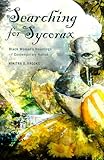Searching for Sycorax : Black Women's Hauntings of Contemporary Horror / Kinitra Brooks, Kinitra D. Brooks.
Material type: TextPublisher: New Brunswick, NJ : Rutgers University Press, [2017]Copyright date: ©2018Description: 1 online resource (220 p.) : 10Content type:
TextPublisher: New Brunswick, NJ : Rutgers University Press, [2017]Copyright date: ©2018Description: 1 online resource (220 p.) : 10Content type: - 9780813584621
- 9780813584645
- African American women authors
- African American women in literature
- American literature -- African American authors -- History and criticism
- American literature -- Women authors -- History and criticism
- Feminist theory
- Horror in literature
- Horror tales, American -- Specimens -- 21st century
- Horror tales, American -- 21st century -- Specimens
- Women authors, Black -- History and criticism
- Women, Black -- Fiction
- Women, Black -- Fiction
- LITERARY CRITICISM / General
- England
- african literature
- african
- diaspora
- haiti
- horror fiction
- horror
- jamaica
- literature
- shakespeare
- tempest
- trinidad
- women
- 813.00809287 23
- PN56.H6 B76 2018
- online - DeGruyter
- Issued also in print.
| Item type | Current library | Call number | URL | Status | Notes | Barcode | |
|---|---|---|---|---|---|---|---|
 eBook
eBook
|
Biblioteca "Angelicum" Pont. Univ. S.Tommaso d'Aquino Nuvola online | online - DeGruyter (Browse shelf(Opens below)) | Online access | Not for loan (Accesso limitato) | Accesso per gli utenti autorizzati / Access for authorized users | (dgr)9780813584645 |
Frontmatter -- Contents -- Preface -- Acknowledgments -- Introduction. Searching for Sycorax: Black Women and Horror -- 1. The Importance of Neglected Intersections: Characterizations of Black Women in Mainstream Horror Texts -- 2. Black Feminism and the Struggle for Literary Respectability -- 3. Black Women Writing Fluid Fiction: An Open Challenge to Genre Normativity -- 4. Folkloric Horror: A New Way of Reading Black Women's Creative Horror -- Conclusion. Sycorax's Power of Revision: Reconstructing Black Women's Counternarratives -- Appendix: Creative Work Summary -- Notes -- Index -- About the Author
restricted access online access with authorization star
http://purl.org/coar/access_right/c_16ec
Searching for Sycorax highlights the unique position of Black women in horror as both characters and creators. Kinitra D. Brooks creates a racially gendered critical analysis of African diasporic women, challenging the horror genre's historic themes and interrogating forms of literature that have often been ignored by Black feminist theory. Brooks examines the works of women across the African diaspora, from Haiti, Trinidad, and Jamaica, to England and the United States, looking at new and canonized horror texts by Nalo Hopkinson, NK Jemisin, Gloria Naylor, and Chesya Burke. These Black women fiction writers take advantage of horror's ability to highlight U.S. white dominant cultural anxieties by using Africana folklore to revise horror's semiotics within their own imaginary. Ultimately, Brooks compares the legacy of Shakespeare's Sycorax (of The Tempest) to Black women writers themselves, who, deprived of mainstream access to self-articulation, nevertheless influence the trajectory of horror criticism by forcing the genre to de-centralize whiteness and maleness.
Issued also in print.
Mode of access: Internet via World Wide Web.
In English.
Description based on online resource; title from PDF title page (publisher's Web site, viewed 24. Aug 2021)


